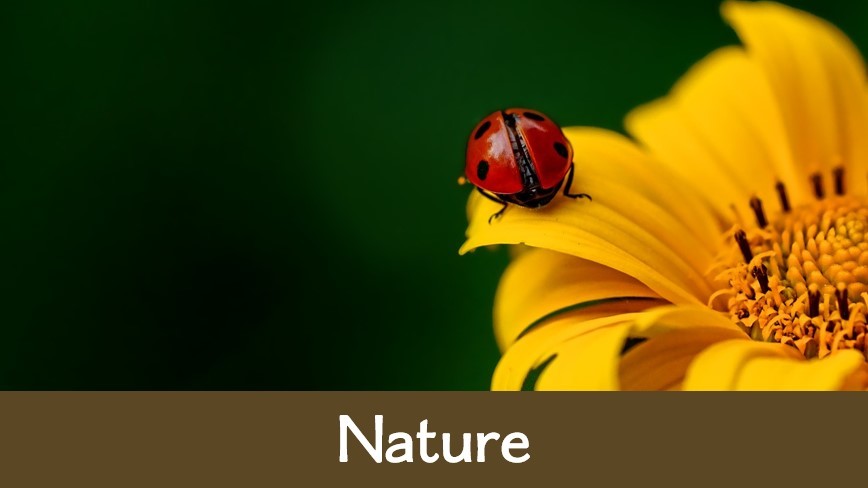At Home with God - Nature
Return to At Home with God - Main Page
Nature is all around us whether we live in the bounty of a natural landscape or in a busy city. Most of us have views of the sky, trees, vegetation, and birds and other wildlife. We may even have potted plants and animals in our homes. Some of us can see mountains, are close to rivers or oceans, or have access to plains or desert vistas. Each of these natural wonders gives us a chance to connect with God.
Psalm 19 teaches us that the heavens, God's creation, declare His glory. Many other passages point to a creative world that not only reflects God's beauty, but also seems to have something to tell us. You might even say that nature "speaks."
If nature is speaking to us, how can we become good listeners? Many of us are good at enjoying the world that God created, but how might we approach nature without an agenda and open our hearts to what it has to say about God? How might we include nature as part of our spiritual experience as a family?

The Westminster Confession states, "Man's chief end is to glorify God, and to enjoy him forever." Nature is always declaring God's glory--his invisible qualities, his eternal power and his divine nature, and it can be a wonderful way for us to both glorify and enjoy God.
Nature also gives us an opportunity to gain God's perspective on our fears and anxieties. Jesus tells his followers to look at the birds and wild flowers when they are tempted to worry about their circumstances. Jesus invites us to notice how creation is cared for by God, and how that observation can give us confidence in God's care for us as well.
Children can teach us how to listen to nature in fresh ways and experience nature with our whole bodies. If you have children with you as you interact with nature, match their pace, notice what they see, welcome their observations and conclusions. Ask simple follow-up questions to understand their experience.
Often children's first experiences of God happen in nature. If you aren't around any children, spend some time reflecting on any experiences of God you remember from your childhood. Did any of them happen in nature? Write out any stories you can recall and share them with your family.

Here are some ideas of how you can include nature in your family experiences:
- Go for a "nature" walk together. taking the time to name what you see on your walk. Flowers, sticks, trees, animals, signs of growth, seeds, insects, etc. Pause when you want to take a closer look to notice the details of God's creation.
- Sit together and watch birds or other small animals around your home. How do they live? What do they spend their time doing? How do they gather their food? How are they "clothed"?
- Plant something as a family to care for and watch grow. You can plant something in your garden or in a pot in your kitchen. Assign different family members tasks to nurture the plant (water, fertilize, etc.). Set regular family times to notice how the plant is doing, how much it has grown, if it looks healthy. Make decisions as a family about any changes you need to make to its care.
- Watch the sky together during the day or at night. What do you see? If you are quiet, what do you feel? What does it feel like to look at the sky together rather than on your own?

The second tool we are suggesting for our toolbox is a nature journal or notebook. This keepsake will be used to store pictures, drawings, or objects from nature that remind us of an experience. it is also a place to record our reflections about God that correspond to that experience.
Make sure the size of your journal will fit into your toolbox. You can use an unlined journal or a simple spiral bound notebook with lined paper.
Take your journal with you when you are outside together. Record your thoughts, or bring back a picture, flower, leaf etc. to press into your journal later. If there isn't an easy way to capture an image of your experience consider drawing something or writing a poem that describes what you saw and felt.
Quick tip: Celebrate the different ways your family listens to nature in what you put in your nature journal. Alternate between those who like to draw, take pictures, use words to describe a scene, or bring back physical mementos of their experience.

The heavens proclaim the glory of God.
The skies display his craftsmanship.
Day after day they continue to speak;
night after night they make him known.
They speak without a sound or word;
their voice is never heard.
Yet their message has gone throughout the earth,
and their words to all the world.
Psalm 19:1-4 (NLT)
Here are some ideas that will help you listen more closely to God in nature.
- Set the tone for your nature experience by asking "I wonder what God wants to say to us as we enjoy creation today?" This will remind everyone including yourself that you are fellow listeners and that there is something that God's creation is declaring.
- Use your journal to record your spiritual observations and feelings from your times in nature. You may find yourself revisiting those experiences again as sometimes we need to reflect for awhile to understand what the Holy Spirit wants to tell us.
- Occasionally review your journal as a family. Notice how God speaks to individuals in different ways. Comment on trends that you see--for example, "Susie, you seem to feel especially close to God when you see flowers."
Use Nature to Celebrate Easter
Here are some ways you can bring nature into your Easter celebration!

